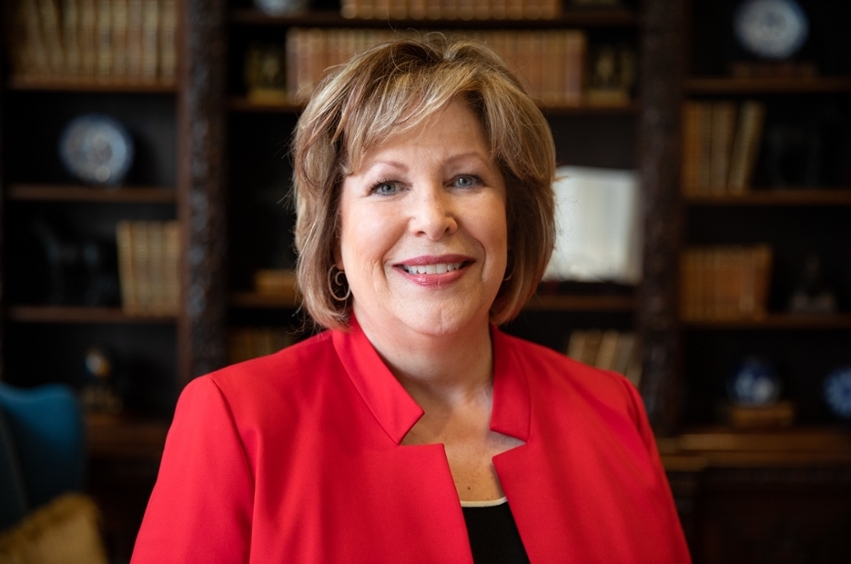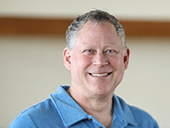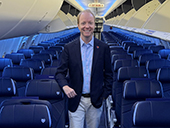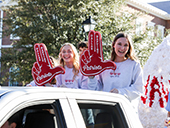DBU Alum Stands before Presidents and Princes as she brings Healing to the Hurting
This article is over six months old and may reference former titles for DBU faculty or staff, discontinued programs, or other details that have since changed. If you have any questions, please contact us at news@dbu.edu, or (214) 333-5172.

"The oil fires were still burning when we got there," 1991 DBU graduate Pam Hall recalls about her arrival in Kuwait. "As we flew in at 11:30 that night, all we could see were orange flames shooting up from the scorched desert. It was how I pictured Hell."
And the word "Hell" adequately described the suffering the Kuwaiti people endured under Sadam Hussein's invasion and occupation. So many lives had been lost; so much pain and grief. As her plane landed on that desert airstrip, Pam did not yet realize that God had brought her to this tiny country on the Arabian Peninsula to fulfill a mission of hope and healing.
Pam Hall had enrolled in DBU's Adult Education program for professionals in 1989. After completing two years of college at Texas Wesleyan, her funds had run short so she had gone to work for American Airlines and quickly rose in the ranks. DBU's degree program, designed to accommodate a professional's schedule, proved a good fit and enabled her to complete her business degree only months before her husband's job uprooted the family and landed them in the recovering war zone of 1991 Kuwait.
Life in Kuwait
Upon disembarking the plane with her fifth-grade daughter in tow, Pam's mind flooded with questions about what life would be like for an American family living in a war-torn Muslim country. Would it be safe? What about the cultural differences? Would she even be allowed to worship Jesus openly here?
But what she found was something she never really expected: a people who truly valued freedom, knew the cost, and freely expressed their gratitude. "Kuwaitis would literally place their hand over their heart and thank America for their liberation," she recalls.
"As we lived there and continued to receive the expressions of gratitude, God planted in our hearts the thought that if we had lost a loved one in Desert Storm, it would be so important to hear the gratitude first-hand and to meet the people that our loved ones had sacrificed for," Pam said. "The families needed to realize how their loved ones are truly memorialized every day in Kuwait."
Desert Peace
And so "Desert Peace" was born. The former airline employee became the organizer of an event that would bring 193 family members of the fallen from Desert Strom to meet the very people their loved ones died to save.
The DBU graduate never dreamed she would stand before princes or presidents, but there she stood face-to-face with HH Sheik Saad Al-Sabah, Kuwait's Crown Prince and Prime Minister, who gave his enthusiastic blessing on Project Desert Peace. And later at the U.S. Embassy in Kuwait, she would be shaking hands with former President George H.W. Bush, who praised the endeavor.
A Time to Heal
Carol and Peter Belas from Kitsap County, Washington lost their son, Lee, in the war. They were among those invited to participate in Desert Peace. Lee's helicopter had been shot down on the last day of the war. The couple had contacted Pam's committee, asking if there was any chance the country's government could track down the Kuwaiti friends their son had fought beside and written to them about.
All they had to go on were the young men's first names: Ahmed and Ayman. Names as common as Mike and Mark in America. It was like looking for a needle in the proverbial haystack. Pam spoke with government officials to see if there were records that could narrow down the search, but everything had been so chaotic after the invasion that there was no way to track anyone.
Then, about a week before the families arrived, Pam received a call. A Kuwaiti named Ahmed who had served with U.S. forces had read about Desert Peace in the Arab Times and he wanted to inquire if a family by the name of "Belas" was coming.
When the Belas family arrived in Kuwait a week later, they not only met Ahmed but visited his home and ate with his family as well. Together they shared the grief of Lee's loss. "It should have been me," Ahmed explained. Ahmed and Ayman were supposed to be in that helicopter, but it was full so the two Kuwaitis had to wait for the next flight. "It should have been me and not Lee," he tearfully told the family as they cried together.
The tears that the American families and Kuwaiti citizens shed melded together in a healing for both as they participated in banquet, memorial services, and celebrations over the course of the week. The Kuwaiti Crown Prince brought the families to his residential palace and spoke to each family member personally. The first Kuwaiti-American International Friendship Day allowed the Kuwaiti people to pour out their thanks to the families who had lost so much.
Places of Influence
After Desert Peace, God kept Pam in places of influence. Sheikh Saud Nasir Al-Sabah, the Kuwaiti Minister of Information, hired her to serve as his Liaison for Western Delegations, coordinating all his official interfacing with diplomats from the West.
The bond Kuwait feels for America is as strong as Pam's love for the Kuwaiti people. Former Kuwaiti Ambassador to the U.S., Sheikh Saud Nasir Al-Sabah (who became Pam's boss), expressed the sentiment of his fellow countrymen when he addressed the visiting American families: "Our blood has been mixed with yours...bonding us straight from the heart."
Crisis and Caring
When Pam and her family returned to the U.S., she went back to work for American Airlines and life began to follow a common course. Juggling meetings, managers, family, and friends, she fell into the rhythm of American life. But the airline executive began having severe headaches. After an MRI, the doctor immediately admitted her to the hospital.
"You have a brain tumor and if we do nothing about it, you will be dead in a week," he said.
Thankfully, surgeons were able to quickly remove the tumor and discovered it was benign. However, the medical concerns led her to cut her career short. Still, that did not stop her investment into the healing of others.
Today, she serves as a volunteer with Court Appointed Special Advocates, better known as CASA. Instead of reaching out to war-torn countries and the families of the fallen, she now fulfills God's call to heal the brokenhearted children who have fallen victim to abuse and neglect here in the DFW area. She advocates for the children who have been assigned to her in much the same way parents advocate for their own child.
More than 400 children are waiting for a CASA advocate. Pam eagerly encourages others to become involved in helping the most vulnerable among us.
God has made Pam Hall his tool of healing in a very wounded world. She explains that the concept of the "servant leader" plays a key role in what she does.
"If you have a willing heart and respond when prompted, you don't have to worry. When it's God's project, He will provide," Pam said. "Desert Peace was God's project, not my project. I just had to be available."
Trudy Chun serves as a freelance writer for DBU and served as a missionary in Eastern Hungary for more than a decade. Her husband, Russell Chun, teaches English in our International Department, and the two and their family are very actively involved with World Relief. She is the author Love & Ashes and The BuddhaPest, as well as the co-author A Story of Grace.








